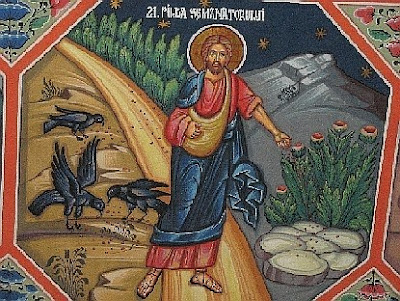ABANDONMENT TO GOD’S PROVIDENCE.
July 12 2020
Fifteenth Sunday in Ordinary Time – A
A Latin proverb says, “Providence our herald, no barrier can
oppose us.” And a Portuguese proverb adds, “Faith has no eyes; he who asks to
see has no faith.”
We all know well that children are different from adults.
This is not a matter of age or physiognomy. The greatest difference between
children and adults is the virtues they incarnate. Easily, children trust and
express a complete and perfect abandonment. They are a creature of dependence.
In children, there is no duplicity nor plasticity. Hypocrisy is inexistent in
the dictionary and the vocabulary of children. When a child likes something or
someone, he expresses it. When he does not like he cannot hide his feeling of
discomfort. Oppositely, adults are champions in duplicity, plasticity, and
hypocrisy.
In the Gospels, what the Lord Jesus asks of his disciples is
the childlike attitude. And one of them is the virtue of abandonment to the
will and the providence of our Heavenly Father. We are invited to be children
of the divine providence, people who firmly trust that God, because of his
lovely and paternal concern for mankind, will always take care of our needs. We
should, therefore, not worry about anything but rather have faith in Him, be
like children, no worries but always happy and confident.
Adults put question and seldom believe. Children instead,
believe without questions, and if they do have questions, these questions do
not prevent them from believing wholeheartedly. Thus, Jesus in last Sunday’s gospel
gave praise and thanksgiving to the Father saying, “I give praise to you,
Father, Lord of heaven and earth, for although you have hidden these things from
the wise and the learned you have revealed them to little ones.”
The main theme of today’s liturgy is providence. Speaking of
providence, addressing the members of his religious congregation, the Sons of
Divine Providence, St. Luigi Orione says “sons of divine providence means sons
of the faith”. That is, without faith, one cannot abandon himself to God’s
providence. It is out of faith that one can put all his cares on God and, like
a little child, abandon himself into His hands.
The Prophet Isaiah, in the first reading, tells us that
God’s word that comes from His mouth is like a rain. It does not evaporate or
return to Him without achieving what he sent it for. The psalmist echoes this
when he invites us to sing, “The seed that falls on good ground will yield a
fruitful harvest.” All the process till the harvest are works of God’s
providential love.
Through the parable of the sower, Jesus, in the Gospel,
tells his followers, what should be our part, our contribution to God’s
providential work. The seed is sure, it contains life. The sower is an expert,
a well-skilled in His art. The surviving and the fruitfulness of the seed,
however, depends on the ground that welcomes it. Thus, the Lord lists different
categories of ground: the pathway, the rocky ground, the thorns, and the rich
soil. All is about which soil receives the seed and how does it welcome it.
We live in societies made of so many worries and chocking
situations. Our world is made of so much noises that, oftentimes, we fail to
listen rightly to God’s word and to let it penetrate the ground of our heart,
take roots and be effective and fruitful in us. Though the providence is still
at work and very active in us, we do not open ourselves faithfully to it, or if
we do so, it is with many conditions, not letting any liberty to God’s action.
Some people want to do all by themselves. In so doing, they give no chance for
the abandonment unto God’s grace.
Besides, each of us should be honest to recognize that the
world has become a very hard and rocky ground for the word of God. Though we
listen to many beautiful preaching and sermons every day, they seem to be only
for reference and religiosity, no impacts on life. How many things calls upon
us to have faith in God, to come back to Him and abandon ourselves to Him.
However, all these are effectless or impactless on us. We swim in God’s word
like ducks swim in the water without getting wet. Many are they who can recite
the Bible from Genesis to Revelation. But their life is an answerable question,
for in complete disconnection with what they preach. Instead of imitating and
incarnating the confident abandonment of children, we have embraced their
stubbornness. People today are hard-headed and hard-hearted. Some have even
lost their humanity.
St. Paul, in the second reading rightly tells us that, sowing is difficult. It is accompanied by many hardships and pains. Nevertheless, from those sufferings will spring a new life and a fruitful harvest. God's providence never abandons us, despite our sins, even if we rarely trust Him. Then this warning from this Spanish proverb to close our meditation, “He who lost his faith, has nothing more to lose.” Let us never lose our faith in God’s providential love.





Comments
Post a Comment